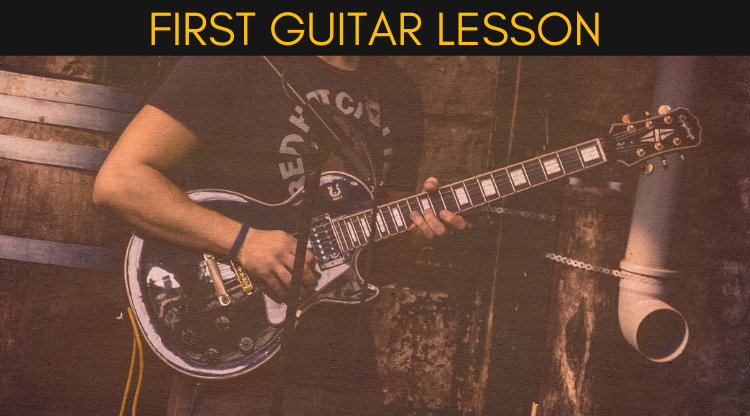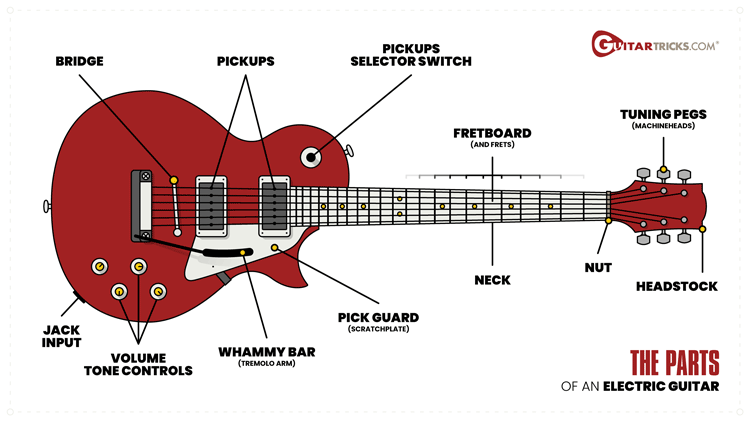
Your first guitar lesson is a bit like stepping into a new realm – a mix of excitement, anticipation, and maybe a dash of nervousness.
Don’t worry about it!
Because your first guitar lesson will be fun and exciting.
It's not just about learning chords and strumming patterns; it's about finding your rhythm, discovering your musical preferences, and building a foundation for a skill that will stay with you for a lifetime.
Let's get into your very first guitar lesson.
First Guitar Lesson - Tuning
Let’s start with the guitar itself.
What is this thing?
Here’s a diagram of the parts of the guitar:

You definitely won’t need to commit this chart to memory, but knowing some basic terminology will go a long way.
As you get comfortable with the guitar in your hands, the first order of business is usually tuning.
Using a clip-on guitar tuner is a great way to go.
These things are super accurate, and they are so conveniently small!
Nothing played on an out of tune guitar will sound good, so get that dialed in first and foremost.
You will use the tuning pegs to tighten or loosen a specific string to the desired pitch.
Your First Guitar Chords and Rhythms
Now, let's talk about those first guitar chords.
Ah, the sweet sound of your fingers hitting the strings for the first time – it's a symphony of trial and error.
The first guitar lesson is where you get to know your frets from your strings, your E's from your G's.
The best idea is to start off with some basic chords like C major, G major, and D major.
These are the building blocks of countless songs, literally hundreds, and mastering them will unlock the next level of playing.
As you strum through those chords, your fingers may protest a bit – they're not used to pressing on those steel strings.
But fear not, this is part of the process.
Building finger strength and dexterity is a right of passage experienced by every guitarist.
Remember, building calluses is a big reason why people quit their beginner guitar lessons.
If you can make it through this phase, you’ll be further along than most!
Now that you have a couple of chords under your fingers, it’s time to start thinking about the other half of music – rhythm.
This is where you discover the magic of strumming patterns and how they transform a simple chord progression into a full song.
Rhythm, beat, time, feel; these words all describe the same thing.
Having a grasp on the rhythmic timing of music might be even more important than specific notes themselves.
Be sure to keep rhythm in mind as you start off on your first guitar lesson.
Your First Guitar Scales
The last thing to add to this very first introductory guitar lesson would be a couple of scales.
Don’t roll your eyes just yet!
While they might seem a bit tedious, guitar scales are the keys to unlocking advanced levels of the guitar.
The two scales to start with would be the Major scale and the Minor Pentatonic scale.
The major scale will help you understand how music theory relates to the guitar.
The Minor Pentatonic scale is a bit more practical and can be easily applied to guitar solos and songs.
Continued Practice
At this point you’ve learned a bit about the parts of the guitar, how to tune your guitar, 3 fundamental chords (therefore hundreds of songs), some rhythmic strumming patterns and some foundational scales.
For the very first guitar lesson, that’s a lot of info!
Moving forward, do the same process every practice session; tune, learn songs with easy chords, work on your rhythm, practice some scales.
If you do this routine for 15 minutes per day, you’ll notice improvement within a week!
Your first guitar lesson is not just a lesson; it's the opening chord in the melody of your guitar-playing adventure.
Get ready to strum, stumble, and savor every moment, because the first guitar lesson is just the beginning of a harmonious journey that will resonate with you for a lifetime.
FAQ
What should a beginner guitarist learn first? In your first guitar lesson, focus on the basics. Get comfortable holding the guitar, learn to tune it (maybe with a guitar tuning app), and start with simple strumming patterns.
What is the first note to learn on guitar? The open E string is the go-to starting point. It's that low, thick string that sets the tone for tuning your guitar. So, when you're diving into your first guitar lesson, make friends with that open E note – it's your guitar tuning buddy.
What should I cover in my first guitar lesson? Dive into your first guitar lesson by getting to know your instrument. Cover the parts of the guitar, how to hold it comfortably, and start with basic strumming and picking techniques. Your first guitar lesson is like a musical introduction – chords, tunes, and a sprinkle of music theory.
What chord is the first lesson on guitar? The star of the show in your first guitar lesson is often the C major chord. It's like the icebreaker of chords – friendly, approachable, and a great starter. Your fingers will dance on those frets, and you'll find yourself strumming through the beginning of your guitar journey.
What 3 guitar chords should I learn first? Kickstart your chord journey with the classic trio – C major, G major, and D major. Master these, and you'll unlock the gateway to countless songs.
In what order should I learn guitar? When it comes to learning guitar, start with the basics – tuning, holding the guitar, and strumming. Move on to fundamental chords like C, G, and D, then gradually explore more complex techniques.
Can guitar be self-taught? Absolutely! Your first guitar lesson doesn't always have to be in a formal setting. With online guitar lessons like these, you can easily teach yourself.
What is the hardest stage of learning guitar? Barre chords can feel like climbing a musical mountain. They might be the trickiest stage in your guitar learning adventure. But fear not, with persistent practice, your fingers will get the hang of barring all those strings, and the hard part will become second nature.
Is 1 year enough to learn guitar? A year is a great starting point! With consistent practice, you can build a solid foundation and strum through various songs. Your first guitar lesson sets the tone, and within a year, you'll surprise yourself with how much you've learned.
Is 30 too old to learn guitar? Never! It's never too late to pick up the guitar. Whether you're 30 or beyond, your first guitar lesson is a timeless experience. Embrace the strings, enjoy the process, and let the music be your guide, no matter what age you are.